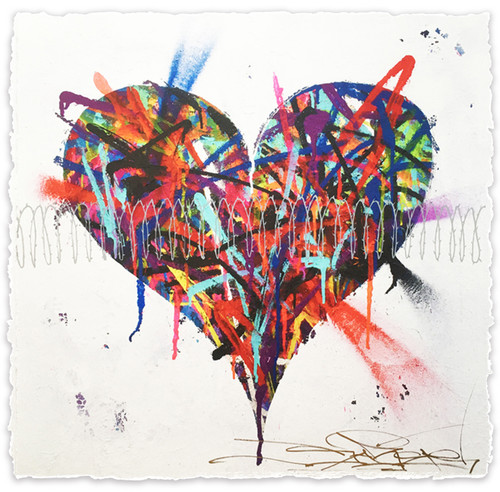-

Love Los Angeles Style
WIP by SABER
Artist: SABER Title: WIP Edition: Hand Embellished Archival pigment print on sustainable Bamboo Paper with hand deckled edges, from an edition of 25. Size: 18 x 18 inches Markings: Hand signed and numbered with LLAS chop mark. Date: 2021
SABER
Among the thousands of people who make up the graffiti community around the world, there are few names that carry the same legendary quality as SABER. Born in the Los Angeles suburb of Glendale, SABER was raised by creative parents and discovered his passion for art at an early age. At 13, his cousins introduced him to graffiti when they took him to see the spray paint-covered Belmont Tunnel. From that moment on, he was hooked. After honing his skills on local walls, SABER joined MSK, and was later inducted into legendary piecing crew AWR.
SABER was already a fixture in the Los Angeles graffiti scene by 1997 when he completed the largest graffiti piece ever created. His piece on the sloping cement bank of the Los Angeles River was nearly the size of a professional football field, and took 97 gallons of paint and 35 nights to complete. In a famous photograph—taken by his father just after it was finished—SABER stands on the piece and appears as a tiny speck amid a giant blaze of color. It catapulted SABER to legend status in the graffiti world.
SABER began exhibiting in his fine art in 2002. While known for his elegant and aggressive abstract letterforms, SABER's artistic output has also included drippy, surreal cityscapes and his painstakingly rendered "new reality" canvases. SABER has also worked corporate projects with Hyundai, Scion, Boost Mobile, Roland Sands Design, Montana Paint Company, and Karmaloop. His monograph, SABER: MAD SOCIETY, complete with stories of his graffiti misadventures, was released by Gingko Press in 2007 and is now in its second printing.
In October 2010, SABER released a video in which the year's heated debate about healthcare was spray painted over the American flag. While some saw it as desecration, SABER advocated for healthcare reform in the video, revealing that he had epilepsy and was un-insurable. This work led SABER to create a large group of American flag paintings called the Tarnished series.
In 2011 SABER's artwork is featured in two museum exhibitions, "Street Cred" at the Pasadena Museum of California Art and "Art in the Streets" at MoCA Los Angeles.
